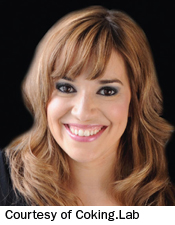Exploring the science of cooking
When a group of women in Lisbon, Portugal, entered a cooking contest in 2006, they decided to put their own spin on a Portuguese fish soup. The team created green fettuccine from gelatin flavored with coriander and garlic, meant to mimic an algae bed. Egg yolk–sized spheres, made of algae extract and filled with fish soup, nestled on top.


The contestants had been asked to apply ideas from molecular gastronomy, a field exploring the science of cooking. In 2007, the Lisbon team founded a molecular gastronomy company called Cooking.Lab. The group educates chefs and the public about the field, creates unusual dishes or drinks for special events and performs research to develop food products with new textures and flavors.
The company began as an informal gathering of five women interested in science and cooking who teamed up to offer molecular gastronomy workshops. After a while, “we felt that we needed to grow a little bit,” says cofounder Catarina Prista, a yeast physiologist and molecular biologist at the Technical University of Lisbon’s Superior Institute of Agronomy. “We were just a bunch of ladies giving workshops.”
Cooking.Lab’s members aren’t your average home cooks, though: They’re trained in biochemistry, microbiology, cooking and food engineering and design. They often employ lab methods plucked from a broad range of scientific fields. For a 2007 contest, for example, the team borrowed a DNA separation technique using a sugar gradient solution and centrifuge to make a multilayered “molecular cocktail” with mint, raspberry, lemonade and edible gold.
But molecular gastronomy is not just a set of cooking techniques, says cofounder Joana Moura (shown left). The field can include any experiment to investigate why specific ingredients, conditions and methods produce certain cooking results. “You can apply molecular gastronomy even if you’re doing a fish at home or cooking some vegetables,” she says. The company published a molecular gastronomy book in Portuguese called Cozinha com Ciência e Arte (Cooking with Science and Art) last year and plans to develop a smartphone app.







